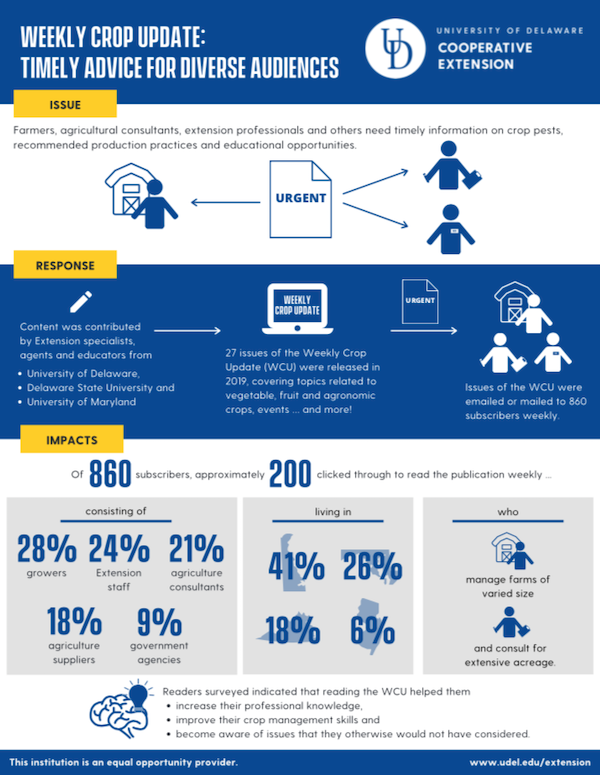
Weekly Crop Update: Timely advice for diverse audiences (2019)


ISSUE
Farmers, agricultural consultants, Extension professionals and others need timely information on crop pests, recommended production practices and educational opportunities.
RESPONSE
The Weekly Crop Update (WCU) is a University of Delaware Cooperative Extension newsletter that covers production topics related to vegetable, fruit and agronomic crops. Extension specialists, agents and educators from the University of Delaware, Delaware State University and the University of Maryland contribute articles to this publication. The newsletter also includes announcements about upcoming educational events organized by Cooperative Extension and its partners. In 2019, the WCU was published on March 1 and then each Friday from April 5 through Sept. 27 for a total of 27 issues. The year 2019 marked the 27th year of the publication’s release.
Both the blog and PDF versions of the Weekly Crop Update are available online for free. There are currently about 860 subscribers who receive an email alert when a new issue is posted and, of these, approximately 200 click through to read the issue each week.
IMPACT
In September and October 2019, 34 current Weekly Crop Update subscribers completed a survey. Responses indicated that this response group consisted of 24% growers, 21% agriculture consultants, 24% Cooperative Extension staff, 18% agriculture suppliers and 9% government agencies. The largest percentage of respondents marked that they lived in Delaware (41%), while a majority of the rest lived in the neighboring states of Maryland (26%), Pennsylvania (18%) and New Jersey (6%).
Eighteen respondents reported the amount of acreage on which they find themselves using the information gained from the WCU: a total of 255,551 acres which they either manage or provide consultation for. Based on the responses to this question, the Weekly Crop Update is used by people managing farms of various sizes as well as those providing consultation for extensive acreage. The distribution of acreage size listed by these respondents was quite evenly divided between managing small farms of 50 acres or less (28%) or large farms of 250 to 5000 acres (44%), and consulting on farms over 10,000 acres (28%).
One goal of this publication is to educate readers on a variety of crop production topics. The majority of respondents indicated that the WCU increased their knowledge of disease management (91%), insect/mite management (85%), vegetable crop management (79%), weed management (74%) and soil fertility and soil health (65%). Fifty percent of respondents also reported that the WCU increased their knowledge of irrigation management — a topic that received additional emphasis in the 2019 issues of the WCU due to the availability of new research-based recommendations.
Survey respondents expressed that they have used knowledge gained through the WCU in a variety of ways. Many indicated that this new knowledge helps them identify insect pests, diseases, physiological disorders or weeds (76%) and implement effective pest, weed and disease control strategies (76%). Seventy-four percent reported that the information helped them to improve their skills in crop nutrient management, soil fertility and soil health management. Fifty-nine percent said that it helped them to improve skills in cultural (growing) practices. Fifty percent indicated that the WCU helped them to prevent yield loss and twelve percent said that it helped them to start growing a new crop. Twenty-four percent of respondents used the information provided to manage their irrigation for optimal yield.
Respondents also indicated that the WCU had prompted them to scout fields for insects (65%), disease (68%) or weeds (41%) that they otherwise would not have looked for. For nearly all of the respondents (97%), the publication had helped them identify an insect, disease, weed or disorder/nutrient deficiency that they were unfamiliar with.
Finally, past WCU articles available in the web archive serve as a valuable resource for readers. Ninety-one percent of respondents indicated that they often (38%) or sometimes (53%) reference information from past articles of the Weekly Crop Update.
